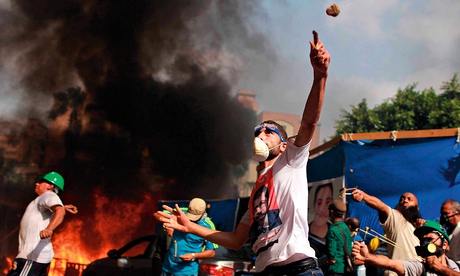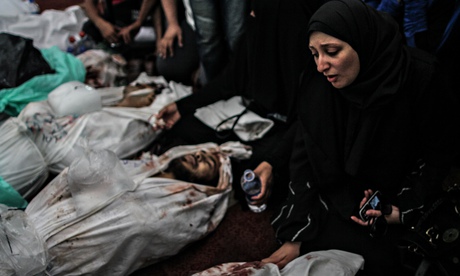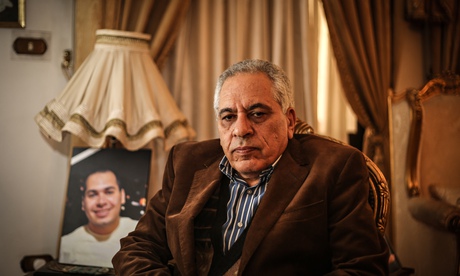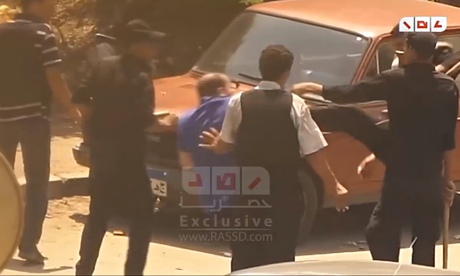Last
August, outside Abu Zaabal, 37 prisoners trapped in the back of a van
were allegedly gassed to death having been held for six hours in
temperatures close to 40C. Patrick Kingsley talks to the survivors and,
for the first time, reveals their side of the story

Protesters at the Rabaa mosque in Cairo. Photograph: Mosa'ab Elshamy/EPA
Deeb had good reason to fear for his life. He was among 45 prisoners squashed into the back of a tiny, sweltering police truck parked in the forecourt of Abu Zaabal prison, just north-east of Cairo. They had been in the truck for more than six hours. The temperature outside was over 31C, and inside would have been far hotter. There was no space to stand and the prisoners had had almost nothing to drink. Some had wrung out their sweat-drenched shirts and drunk the drops of moisture. Many were now unconscious.
Most of the men inside that van were supporters of Mohamed Morsi, Egypt's first elected president. Squashed against Deeb was Mohamed Abdelmahboud, a 43-year-old seed merchant and a member of Morsi's Muslim Brotherhood.
Following four days of mass protests against his year-long rule, the army had overthrown Morsi and the Brotherhood in early July. In response, tens of thousands of people camped outside the Rabaa al-Adawiya mosque in east Cairo to call for the president's reinstatement. Within a week, the space outside Rabaa turned from an empty crossroads to a sprawling tent city that housed both a market and a makeshift field hospital. At Rabaa's centre was a stage where preachers led prayers and firebrands spouted sectarian rhetoric. At its edges were a Dad's Army of badly equipped guards, dressed in crash helmets and tae kwon do vests, standing before a series of walls built of stones ripped from pavements. From behind these barricades, two or three times a day, protest marches would snake into nearby neighbourhoods, blocking major thoroughfares and paralysing much of the city. Clashes between armed police and protesters claimed more than 170 lives.

A woman mourns at a makeshift morgue following the dispersal of the crowds gathered at Rabaa. Photograph: Mosa'ab Elshamy/EPA
For Islamists, Rabaa was one of the last remaining symbols of freedom. But for the millions who opposed Morsi, it was a hideout for violent extremists who were holding the country to ransom. Confrontation became inevitable. On Wednesday 14 August, some time after 6am, police and soldiers surrounded the camp, which still contained thousands of women and children. In the 12-hour operation that followed, more than 900 protesters were shot dead, many by sniper fire. A group of armed protesters fought back, killing nine policemen, according to Human Rights Watch. But they were vastly outnumbered. As police locked down the streets around the camp, they arrested thousands – not just Morsi supporters, but also dozens of residents and workers caught in the wrong place at the wrong time.
On Sunday 18 August, Professor Gamal Siam, an economist at Cairo University, arrived at the office of Egypt's chief prosecutor, Hisham Barakat. His oldest son, Sherif, had been arrested the previous Wednesday, during the crackdown at Rabaa. But there had been a mistake, his father told the chief prosecutor, and he needed help.
Sherif Siam was not a member of Morsi's Muslim Brotherhood, nor even a Morsi supporter. Sherif had said on Facebook that the president's overthrow had been not a coup, but a revolution. Certainly, he had visited the camp at Rabaa al-Adawiya two or three times, but he'd been to anti-Morsi marches, too. When the news broke of the Rabaa camp's dispersal, his father said Sherif went down to help the wounded.
 Gamal Siam, whose son Sherif, a telecoms engineer and life coach,
died in the van. Photograph: Mosa'ab Elshamy for the Guardian
Gamal Siam, whose son Sherif, a telecoms engineer and life coach,
died in the van. Photograph: Mosa'ab Elshamy for the Guardian
On some level, Barakat sympathised. He gave Sherif's father a signed letter to present to prison officials, to help speed up the processing of Sherif's case. But what neither Barakat nor Siam knew was that it was already too late.
A few minutes earlier, in the back of an overcrowded police van on the other side of Cairo, Sherif Siam – and 36 others, including Deeb – had been gassed to death.
The next day, footage emerged (warning: upsetting images) of the 37 corpses on their arrival at Cairo's main morgue. Most of the bodies were bloated, their faces red or black. Deeb's face was one of the few that was unmarked. But Sherif Siam's was swollen and blackened, almost beyond recognition.
What had happened was soon blamed on the prisoners. Police officials said the 37 died shortly before they were due to be handed over to the warders at Abu Zaabal prison, just north-east of Cairo. According to their narrative, the prisoners kidnapped a policeman who opened the door to let them out, prompting his colleagues to fire tear gas inside the truck to subdue them. State media outlets went further, claiming that Muslim Brotherhood gunmen had attacked the van to try to free those inside, and the prisoners died in the ensuing clashes.
Whatever the truth, the news cycle quickly moved on. In a week of horror, other atrocities soon grabbed Egypt's attention. The next day, 25 police conscripts were killed in cold blood in Sinai by Islamist extremists angered by Morsi's removal. The massacres of the previous week – at Rabaa and at Ramses Square – still dominated the media narrative, as did the grotesque Islamist-led revenge attacks on dozens of Christian churches and police stations. Four of the 15 policemen who accompanied the truck were subsequently put on trial for negligence. But that trial was postponed indefinitely in January – and government officials are still able to claim the deaths were provoked by the prisoners.
But they reckoned without the incident's eight survivors, four of whom remain in jail, as well as some of the policemen who drove them to the prison. Five months on, their collected testimonies for the first time reveal a different story – one of police cruelty and a subsequent cover-up that starts not at lunchtime on Sunday 18 August, but on the previous Wednesday, when the 45 prisoners were among thousands arrested in and around the Rabaa al-Adawiya encampment.
 A screenshot from amateur footage of Sherif’s arrest.
A screenshot from amateur footage of Sherif’s arrest.
Police had seized Sherif at around midday a few streets from the camp, where shooting had started six hours earlier. Amateur footage shows him in a blue shirt being led by officers towards a police van, when another officer sprints towards Sherif and fells him with a flying kick to the chest.
Like the thousands of others arrested that day, he was accused of a raft of catch-all charges, including membership of a terrorist group (as the state later designated the Muslim Brotherhood), attempted murder and possession of lethal weapons. It is impossible to know the precise circumstances of his arrest, but for his family, these are preposterous charges. He was a telecoms engineer by day, and had a second career as a life coach. Four days before his arrest, he was interviewed on Egyptian breakfast television about how to find happiness amid the tension and disruption wrought on Cairo by the Rabaa camp.
According to the survivors, Sherif Siam was one of at least eight victims at Abu Zaabal who were either opponents of Morsi, or had no connection to the Rabaa camp. Shukri Saad, a resident of Nasr City, the area surrounding Rabaa, had just bought a month's worth of diabetes treatment when he was stopped by police. They suspected him of buying medicine for people wounded at Rabaa. "I'm not Muslim Brotherhood, I'm NDP," Saad reportedly screamed as he was flung in a police van, in reference to the party of Morsi's predecessor, Hosni Mubarak.
Nearby, Talaat Ali was serving tea to off-duty soldiers and policemen on a break from clearing the camp. The cafe owner decided to close early, because the officers refused to pay for their drinks, so Ali started to make his way home. He said he was stopped by the same policemen he had served. "Hey, I'm the tea guy, I gave you tea," Ali apparently said before he, too, was arrested.
He was soon joined by Mohamed Ramzi, a vegetable seller from west Cairo who had come to Nasr City to sell cucumbers. Then there was Ahmed Hamrawy, on his way to sell his clothes in a market in the centre of town. Rafiq Abdelghany was stopped on his way to work, and would later be granted bail – but he was taken to Abu Zaabal before the bail money could be delivered. A card-carrying member of Ghad el-Thawra, a prominent liberal party, was also rounded up. Nasr City had become a military zone: a curfew had been imposed and anyone moving around was arrested.
Mohamed Abdelmahboud was arrested far from the camp, several hours after the shooting had stopped, as he drove home. He had been at Rabaa since its tents were first pitched in late June. When the siege began, he stayed put. A group of Morsi supporters returned the soldiers' fire, in a hopeless attempt to hold off a security force that included snipers on surrounding roofs and that exacted many more casualties than the small defence squad.
Abdelmahboud says he stayed behind to help the wounded. After 3pm, once the gunfire became too intense to rescue any more of the injured, he made a run for it. Later, he joined up with a group of friends from his home town, a tiny hamlet down a backroad in the Nile delta. They had heard that a friend had been shot in the chaos and they were looking for his body at the Iman mosque, a few streets east of what had been the Rabaa encampment. The air there stank of an odd blend of joss sticks and rotting flesh – it was a smell Abdelmahboud and his friends would grow used to as they spent the evening picking through the long rows of corpses. Some were burnt through, unrecognisable, like logs in a bonfire.
A few metres away, Gamal Siam was searching for his son. Close to midnight, he was shown a YouTube video of Sherif getting a kicking from a police officer. "I was so pleased, even though what it showed was so inhuman," Siam said later. "At least he was alive."
Read More Here



No comments:
Post a Comment
Hello and thank you for visiting my blog. Please share your thoughts and leave a comment :)